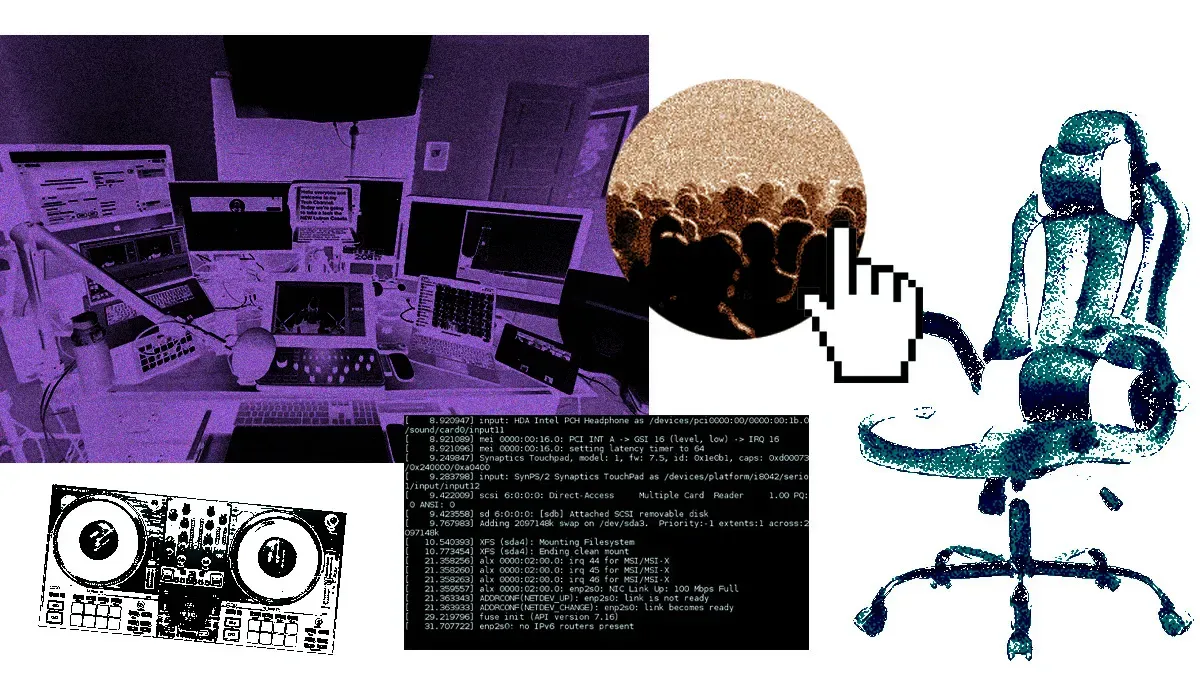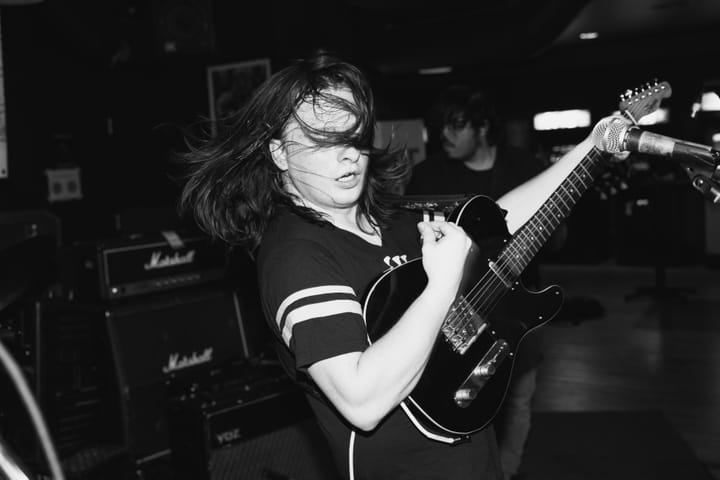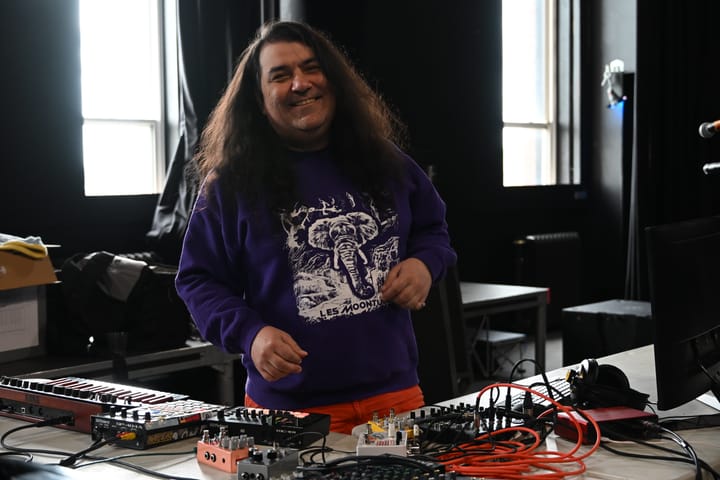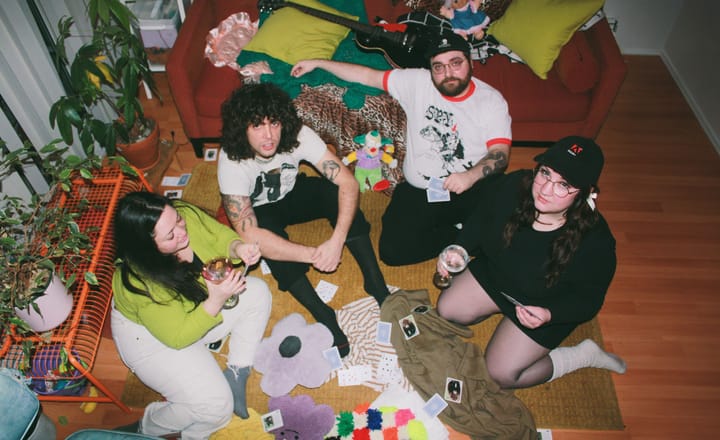
URL/IRL: The Hybrid Initiatives That Are Transcending Barriers Across Canada
The COVID-19 pandemic hit the global music industry hard, but for cities in Canada where venues were already struggling, the nightlife and music scenes in particular really took a blow that seemed like it would be impossible to come back from. But slowly, the restrictions were lifted, people came together as carefully as possible, and despite the loss of many beloved music spaces, passionate artists and music workers continued dedicating energy to collaborating not only on and for dance floors and club environments but with a real focus on community-building, too.
The 2020 pandemic created space to examine how we collectively fail to meet accessibility needs in general and the ways in which internet and media technology could be used to meet some of those needs while creating new avenues of critical connection. With indefinite barriers to meeting in person put in place by law, many online events and initiatives began, which highlighted a needed avenue of accessibility that has always existed but was previously largely ignored. For those unable to attend in-person events—namely those affected by different levels of disability—having the choice to engage within live-streamed shows or events creates access.
Here are five cross-Canada URL/IRL initiatives that have built upon the tools that COVID-19 left us with and are creating bridges and filling gaps by focusing on transcending barriers to foster community:
redgate.tv
For the past 20 years, Red Gate Arts Society has been a reliable and beloved accessible community artists’ space for Vancouver’s underground. When COVID-19 hit, Red Gate’s founder, Jim Carrico, wasn’t sure what the outcome was going to be.
But with some grants coming in and no sign of shows happening as per regulations, it seemed like the opportune time to begin a project that Carrico had been thinking about starting for many years. “Red Gate has always existed with the belief that open-source, direct communication and direct participation is a driving factor in healthy communities,” he says. “It’s definitely what sets apart great arts scenes from ones that tend to fold in on themselves.”
A few cameras, a private, open-source computer server that Carrico built himself, and five years later, redgate.tv has officially launched into the stratosphere. “I always knew this was all coming, the political climate we’re in, the new technology. And I knew that community had to become the centre of that technology.”
Originally just an unsanctioned digital space, the server showcased Red Gate’s diverse talent while providing artists with opportunities for valuable professional-quality recordings of their performances.
And now, “This is a pirate radio station, an anti-feudalistic YouTube, a no-bullshit Spotify. It’s an open-source media hub, and it’s absolutely for everyone.”
Choose your own adventure. And tune in to see what might be on…
>> redgate.tv <<
Bside Radio
Nestled inside the loading dock of the Beaumont Artist Studios, you’ll find a very unique space with a floor made of records. Spearheaded by organizer Jamal Hamadeh and now run by himself and co-organizer Dom Duchamp, Bside is an online-streamed community radio station with a wide range of music programming meant to be a welcoming, inclusive space for everyone.
“My first inspiration is definitely CJSW (UofC campus radio) in Calgary,” Hamadeh says. “I was a volunteer there for a number of years, and the deep ethos of community radio really shaped how I engage with music.”
When Hamadeh relocated to Vancouver shortly before the pandemic, the inspiration he took from CJSW sparked a vision to establish an inclusive and accessible community space of a similar nature in Vancouver, without being attached to college radio. As he connected with Vancouver’s arts scene, he met the Beaumont Studios owners who were eager to repurpose the empty, unused loading dock space at the front of the building. His suggestion to convert it into a studio took off, and it’s now a thriving community radio station with DJ equipment, a hang-out space, and a full on-air setup. A variety of music shows are streamed live worldwide each day with the option of recording.
“We want people to feel like this is a community space, that they can drop in at any time and hang out whether they are DJs or part of the music scene or even if they just appreciate music. This space is possible because of the community around it. If you’re in the area, we want you to feel welcome to come in and hang out!”
>> thebeaumontstudios.com/bside-radio <<
Controller Club
A whole province over, Calgary has made a name for itself over the years as a Canadian hub for music. Home of the National Music Centre (Elton John’s iconic songwriting piano, the Rolling Stones’ Mobile Studio, and the infamous TONTO synthesizer all live there), Calgary also has a dynamic history when it comes to electronic music. But COVID-19 hit Calgary’s nightlife economy particularly hard, and many venues disappeared almost overnight, leaving room for corporate endeavors (with a lot more focus on profits than community) to take over.
Liam O’Neill, with a long history in Calgary’s underground punk scene, saw an opportunity to create something for people to build community through, which birthed Controller Club, a free weekly hangout where anyone was welcome to gather and learn to DJ together.
“I was collecting records and learning to DJ a bit [and] practicing at this queer community cafe called Kaffeeklatsch, and I thought others should learn. I believe in open source, so it’s important to let young people take over and change things and empower people to make decisions.”
This belief became a core tenet of Controller Club, and while O’Neill has since stepped back, the initiative, as well as his goals of passing on the torch to youth, have both been successful. “It’s not about DJing. It’s about showing people how to organize, that they’re smart.”
Tristin O., who is now running Controller Club, was one of those youths.
“I grew up in Rocky Mountain House [Alberta] feeling very isolated as a queer person of colour and moved to Calgary after graduating high school,” Tristin recalls. “I met a lot of my current friends there, and a lot of Calgary’s current rave collectives were founded out of that. I think Liam’s initial initiative, with this intention to give people the tools and skills to go forward and build their own scenes, is the reason that it’s all happening.”
While it started as just a small group of people getting together every Sunday to learn to DJ, Controller Club is now a space that showcases DJs and their creative work through live-streaming and in-person events while operating with the same grassroots ethos that it started with.
“For the overall scene in Calgary, there is a lot of corporate trash, but what’s come out of Controller Club has been possible because people felt emboldened to do their own thing,” O. says. “I’m excited to see where it goes.”
>> youtube.com/@controllerclub <<
DJTAL Studio
Further east in Montreal, the music ecosystem has always been larger and more fortified than it is in Western Canada, with a lot more resources available to support a scene. However, accessible and affordable space for DJs to practice was something that had been lacking. In 2020, artist, DJ, and organizer Syana had a vision.
Syana, only ever having had the opportunity to refine her skills during gigs, learned to DJ on their own using their computer and found the costs of DJ equipment prohibitively expensive. “I really wanted to practice on CDJs. After visiting Pirate Studio in New York, an accessible space to do that really seemed like something we needed in Montreal.”
With the help of Parc-Ex community organization Brique Par Brique, which gave Syana space for her first workshops in 2022, DJTAL Studios has grown into a queer, BIPOC-centred initiative that offers a comfortable and accessible space for DJ lessons, workshops, and a variety of community events located inside Brique Par Brique on Beaumont Ave in Parc Ex.
“DJTAL has two goals. The first is to create a studio with club gear that people with low-cost barriers can access. We tell people to come with friends to make it even cheaper and contribute to building community. And the second goal is to create community activity events, which a portion of revenue from the paid studio goes towards. The ultimate purpose is that we want to give back.”
>> djt.al <<
btwn.us studio
As pandemic restrictions were being lifted, DJ and entrepreneur Phil Vincent saw a need within the Montreal electronic music scene for more spaces revolving around music and DJing that were just meant for hanging out and creating without pretense.
“I wanted to start something for friends to gather and hang out in a lowkey way, a place to literally ‘get between us,’” Vincent explains. “Something a little bit secretive that felt underground but welcoming.”
Starting with a clothing store they had in a converted garage, Vincent held small events promoted only by word of mouth. “btwn.us started when I essentially decided to brand that idea. I was sick of running a store and realized the part I liked most was bringing like-minded people together. That’s the main goal: to bring people together with no creative restrictions.”
After making an instant connection with now-business partner Max Foley, who shared a similar vision, Vincent’s idea blossomed into a community-centred DJ studio for streaming, recording, learning, and gathering located near Frontenac Station. Open since 2024, btwn.us is available for rental 24 hours a day, and the current flagship space encourages people to come in groups or bring their friends.
Taking inspiration from other artist-centric communities across the globe, Foley says there’s a real need for that culture in Canada. “We want to provide a third space, a connective tissue within a common gathering space for people that doesn’t revolve around drugs, alcohol, and social status. It’s a place to gather that keeps the music as the focal point.”
>> btwnus.studio <<
Read more

Sentries: Multifaceted Noise Rock

Step Into Little Stone Crow's World

